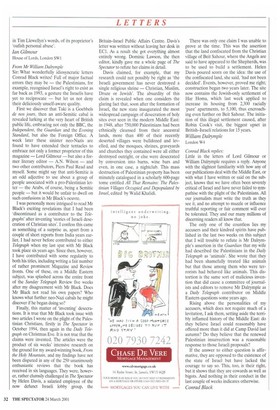From Mr William Dalrymple Sir: What wonderfully idiosyncratic letters Conrad
Black writes! Full of major factual errors they may be — the Palestinians, for example, recognised Israel's right to exist as far back as 1993, a gesture the Israelis have yet to reciprocate — but let us not deny their deliciously unself-aware quality.
First we discover that Taki is a Goebbels de nos fours, then an anti-Semitic cabal is revealed lurking at the veiy heart of British public life, embracing not only the BBC, the Independent, the Guardian and the Evening Standard, but also the Foreign Office. A week later these sinister neo-Nazis are found to have extended their tentacles to embrace not only a former proprietor of this magazine — Lord Gilmour — but also a former literary editor — A.N. Wilson — and two other contributors, Piers Paul Read and myself. Some might say that anti-Semitic is an odd adjective to use about a group of people associated with a pro-Palestinian letter — the Arabs, of course, being a Semitic people — but it would be unfair to dwell on such confusions in Mr Black's oeuvre.
I was personally more intrigued to read Mr Black's exciting revelations that I had been 'discontinued as a contributor to the Telegraphs' after inventing 'stories of Israeli desecration of Christian sites'. I confess this came as something of a surprise as, apart from a couple of short reports from India years earlier, I had never before contributed to either Telegraph when my last spat with Mr Black took place six years ago. Since then, however, I have contributed with some regularity to both his titles, including writing a fair number of rather prominent Magazine and Review fronts. One of these, on a Middle Eastern subject, was splashed across the entire front of the Sunday Telegraph Review five weeks after my disagreement with Mr Black. Does Mr Black not read his own papers? Who knows what further neo-Nazi cabals he might discover if he began doing so?
Finally, this matter of 'inventing desecrations. It is true that Mr Black took issue with two articles I wrote on the plight of the Palestinian Christians, firstly in The Spectator in October 1994, then again in the Daily Telegraph on Christmas Eve. It is not true that the claims were invented. The articles were the product of six weeks' intensive research on the ground for my award-winning book, From the Holy Mountain, and my findings have not been disputed in any of the 250 unanimously enthusiastic reviews that the book has received in six languages. They were, however, rather clumsily challenged in The Spectator by Helen Davis, a salaried employee of the now defunct Israeli lobby group, the Britain–Israel Public Affairs Centre. Davis's letter was written without leaving her desk in EC1. As a result she got everything almost entirely wrong. Dominic Lawson, the then editor, kindly gave me a whole page of The Spectator to refute her claims in detail.
Davis claimed, for example, that my research could not possibly be right as 'the Israeli government has never destroyed a single religious shrine — Christian, Muslim, Druze or Jewish'. The absurdity of this claim is revealed when one considers the glaring fact that, soon after the formation of Israel, the new state inaugurated the most widespread campaign of desecration of holy sites ever seen in the modern Middle East: in 1948, after 750,000 Palestinians had been ethnically cleansed from their ancestral lands, more than 400 of their recently deserted villages were bulldozed and levelled, and the mosques, shrines, graveyards and churches they contained were all either destroyed outright, or else were desecrated by conversion into barns, wine bars and even, in one case, a nightclub. This mass destruction of Palestinian property has been minutely catalogued in a scholarly 600-page tome entitled All That Remains: The Palestinian Villages Occupied and Depopulated by Israel, edited by Walid Khali& There was only one claim I was unable to prove at the time. This was the assertion that the land confiscated from the Christian village of Beit Sahour, where the Angels are said to have appeared to the Shepherds, was to be used to build a settlement. Helen Davis poured scorn on the idea: the use of the confiscated land, she said, had not been decided'. Events, however, proved me right; construction began two years later. The site now contains the Jewish-only settlement of Har Homa, which last week applied to increase its housing from 2,300 racially 'pure' apartments, to 5,100, thus encroaching even further on Beit Sahour. The initiation of this illegal settlement caused, after Robin Cook's visit, the biggest upset in British–Israeli relations for 15 years.
William Dalrymple
London W4














































































 Previous page
Previous page